Management of Flabby Tissue with Reinforcement of Metal Mesh in Custom Tray
Veena Raghottam Saraf1, Sayali Sunil Kalantri2, Divya Govindprasad Toshniwal3, Deepak Macchindra Vikhe4
1 Reader, Department of Prosthodontics, Rural Dental College, Pravara Institute of Medical Sciences (Deemed University), Loni, Maharashtra, India.
2 Postgraduate Student, Department of Prosthodontics, Rural Dental College, Pravara Institute of Medical Sciences (Deemed University), Loni, Maharashtra, India.
3 Postgraduate student, Department of Prosthodontics, Rural Dental College, Pravara Institute of Medical Sciences (Deemed University), Loni, Maharashtra, India.
4 Reader. Department of Prosthodontics, Rural Dental College, Pravara Institute of Medical Sciences (Deemed University), Loni, Maharashtra, India.
NAME, ADDRESS, E-MAIL ID OF THE CORRESPONDING AUTHOR: Dr. Veena Raghottam Saraf, Reader, Department of Prosthodontics, Rural Dental College, Pravara Institute of Medical Sciences (Deemed University), Loni-413736, Maharashtra, India.
E-mail: dr_veena_mds@yahoo.co.in
Patients with flabby tissue require impression procedures which will record the entire denture bearing area in a functional form and the flabby tissue in undisplaced form. This article presents simple and practical approach, to incorporate reinforcing metal mesh in to the custom tray to minimize the displacement of flabby tissue while making the impression with predictable outcome.
Impression technique, Modified custom tray, Undisplaced tissue
Case Report
A 72-year-old male patient reported to Department of Prosthodontics, Rural Dental College Loni, Maharashtra, India, with the chief complaint of loose upper denture and difficulty in eating. Past dental history revealed that, he was edentulous from past nine years, had two sets of complete dentures made and the existing denture was four-year-old. Clinical examination revealed the presence of flabby tissue in the anterior maxillary ridge extending between the canine regions and involving part of rugae [Table/Fig-1]. To gain adequate support from the basal seat area, it was decided to record the flabby tissue in undisplaced form and the reminder of the basal seat in functional form, for this a novel impression technique was developed.
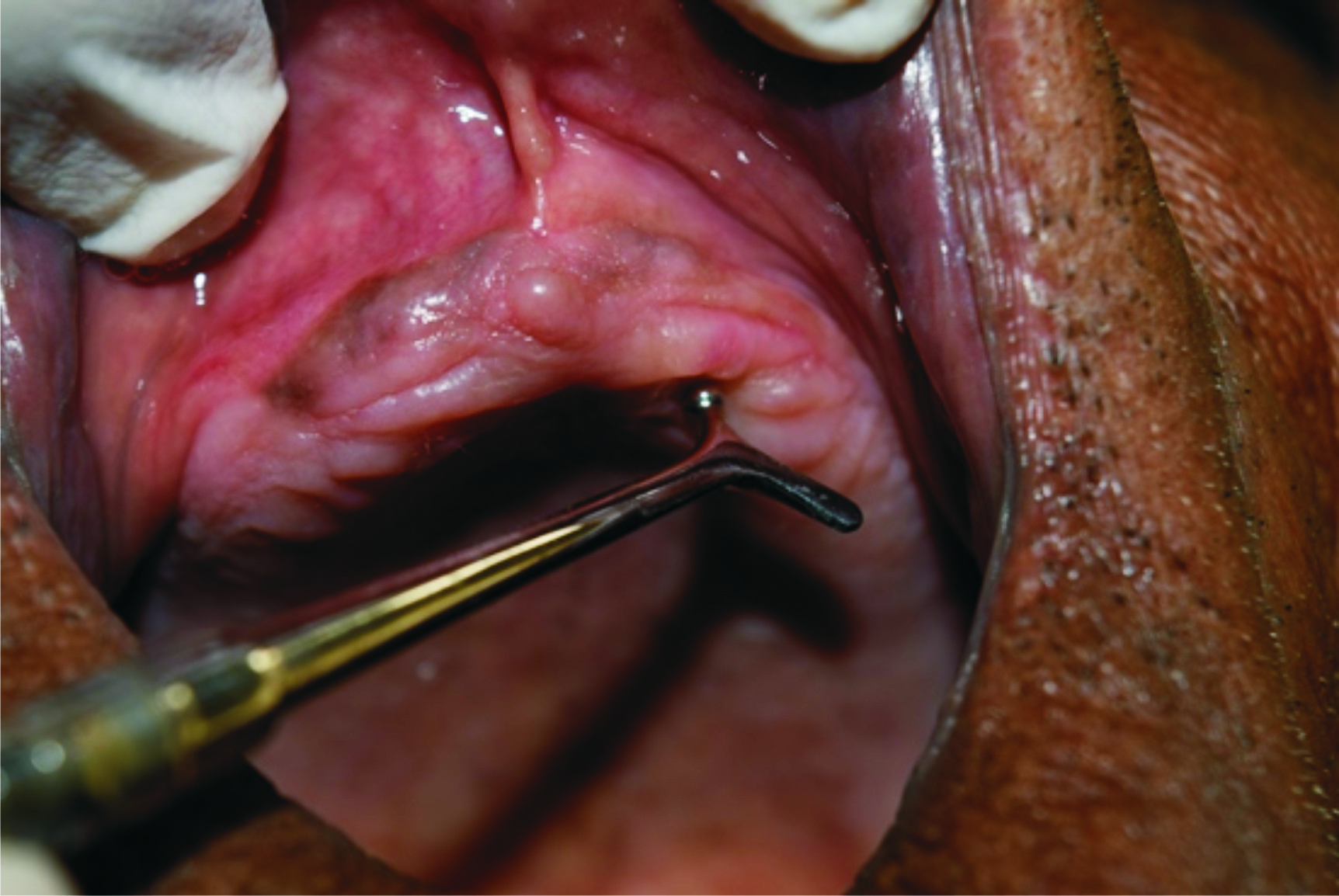
Technique
Identify and mark the flabby tissue area as shown in [Table/Fig-1]. Make the impression using irreversible hydrocolloid (DPI Imprint) as depicted in [Table/Fig-2], pour the cast as shown in [Table/Fig-3]. Adapt double thickness modelling wax spacer (Elite), wrapped in tin foil on the marked area of flabby tissue and the mid palatine raphe on the cast as illustrated in [Table/Fig-4]. Adapt 0.5 mm thick spacer wax (Elite), wrapped in tin foil on top of already adapted wax spacer, prepare tissue stops in the region of canine and first molar, uncover posterior palatal seal area as in [Table/Fig-5]. Trim the metal mesh/Sieve in to appropriate shape of flabby tissue area and adapt over the spacer in the region of flabby tissue on the cast, fabricate special tray using light cure acrylic resin (Supertec), prepare the handle in the centre of the tray for ease [Table/Fig-6]. Check and modify the extensions of the special tray intra orally. Complete the border molding procedure, then remove the spacer and make escape holes [Table/Fig-7]. Make single step impression using light viscosity polyvinyl siloxane impression material (Aquasil LV Dentsply) as shown in [Table/Fig-8].
Irreversible hydrocolloid impression.
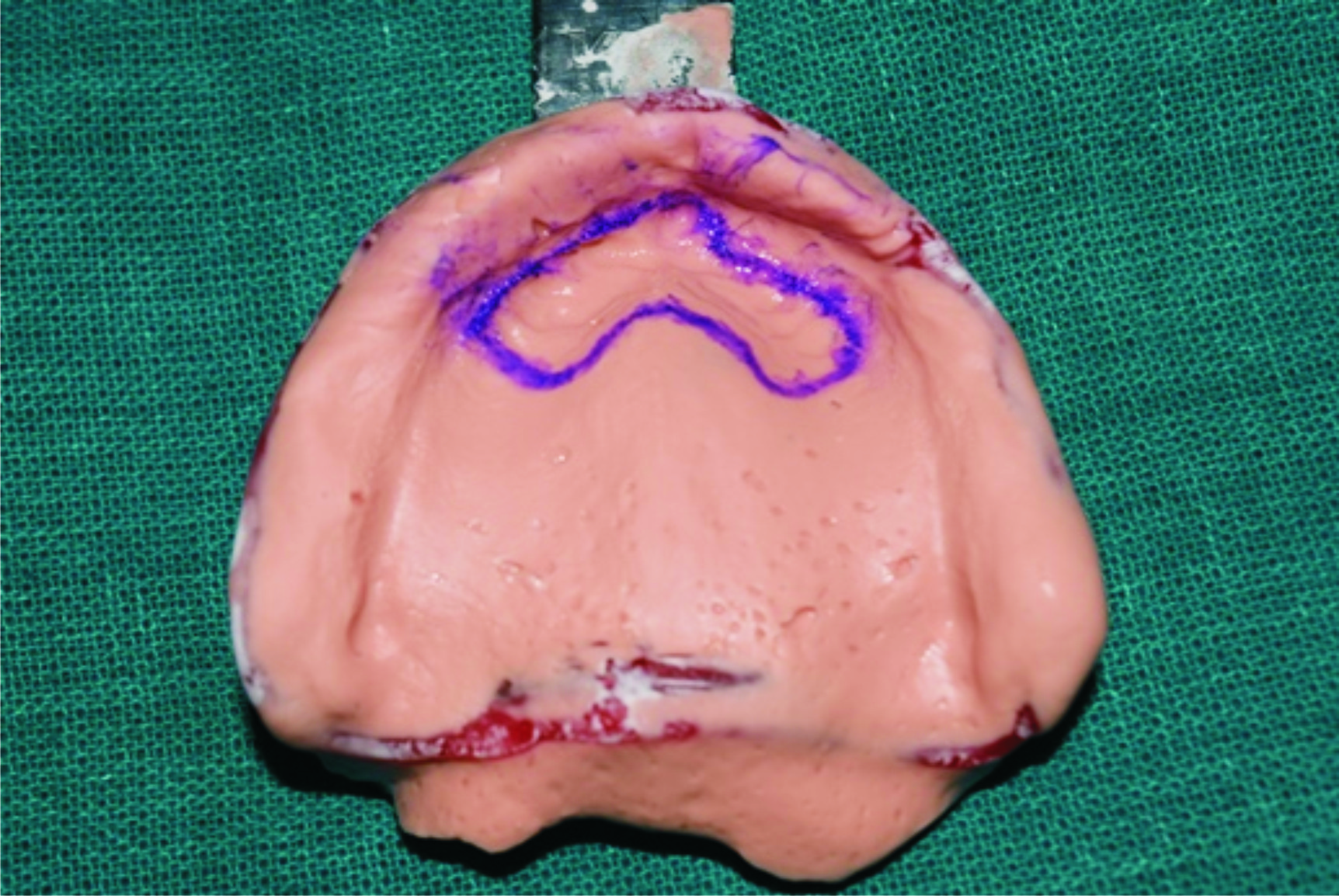
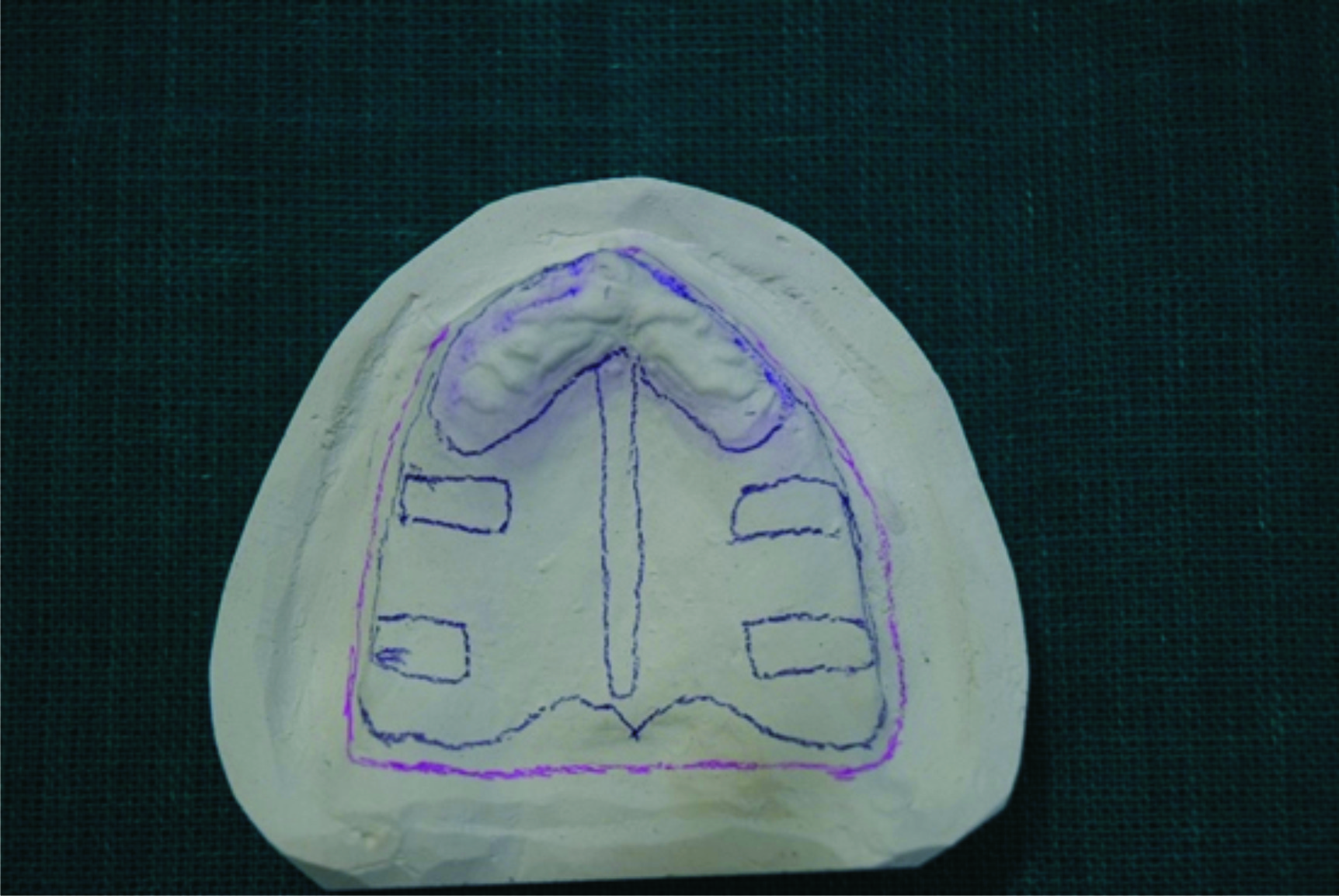
Spacer in the area of Flabby tissue.
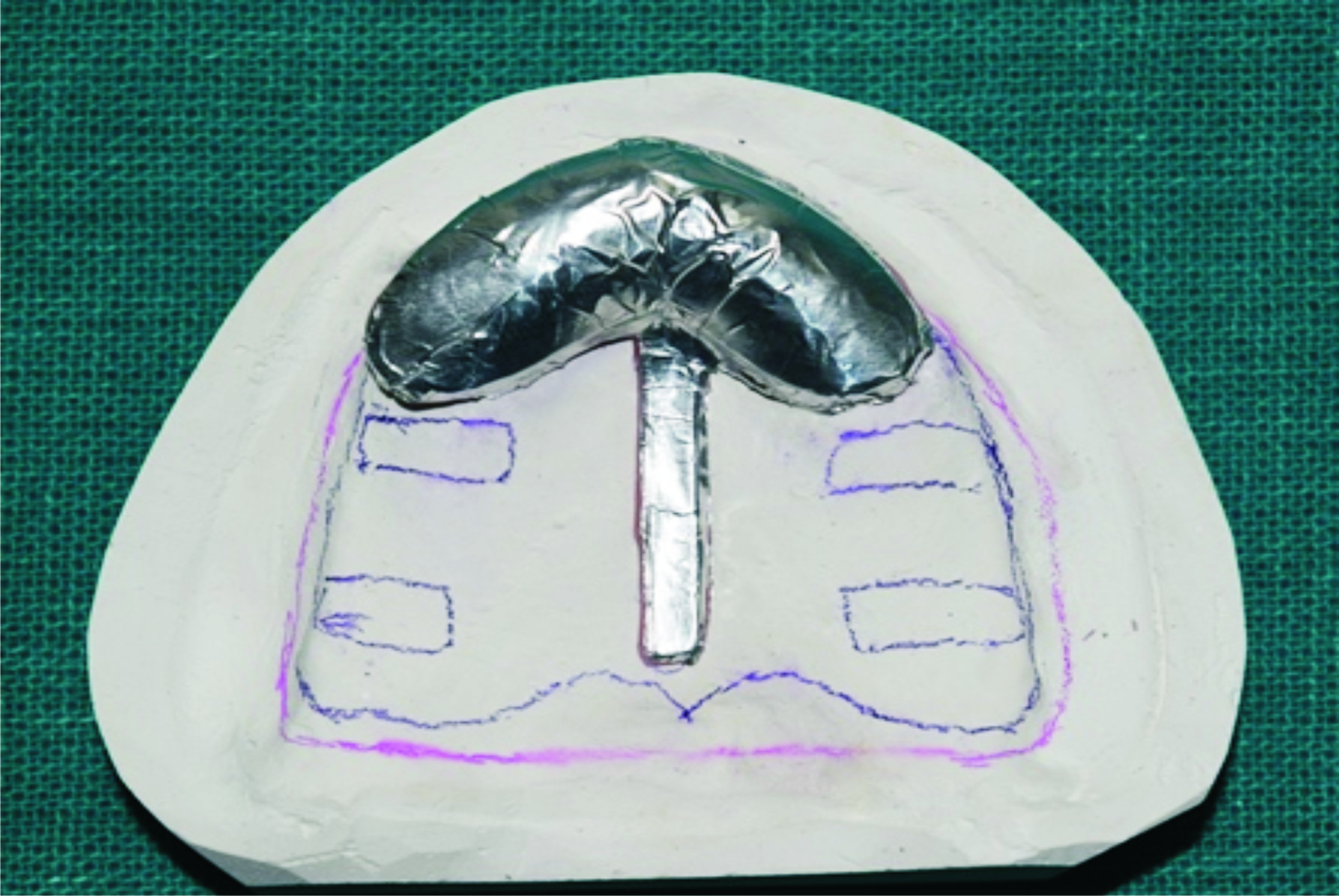
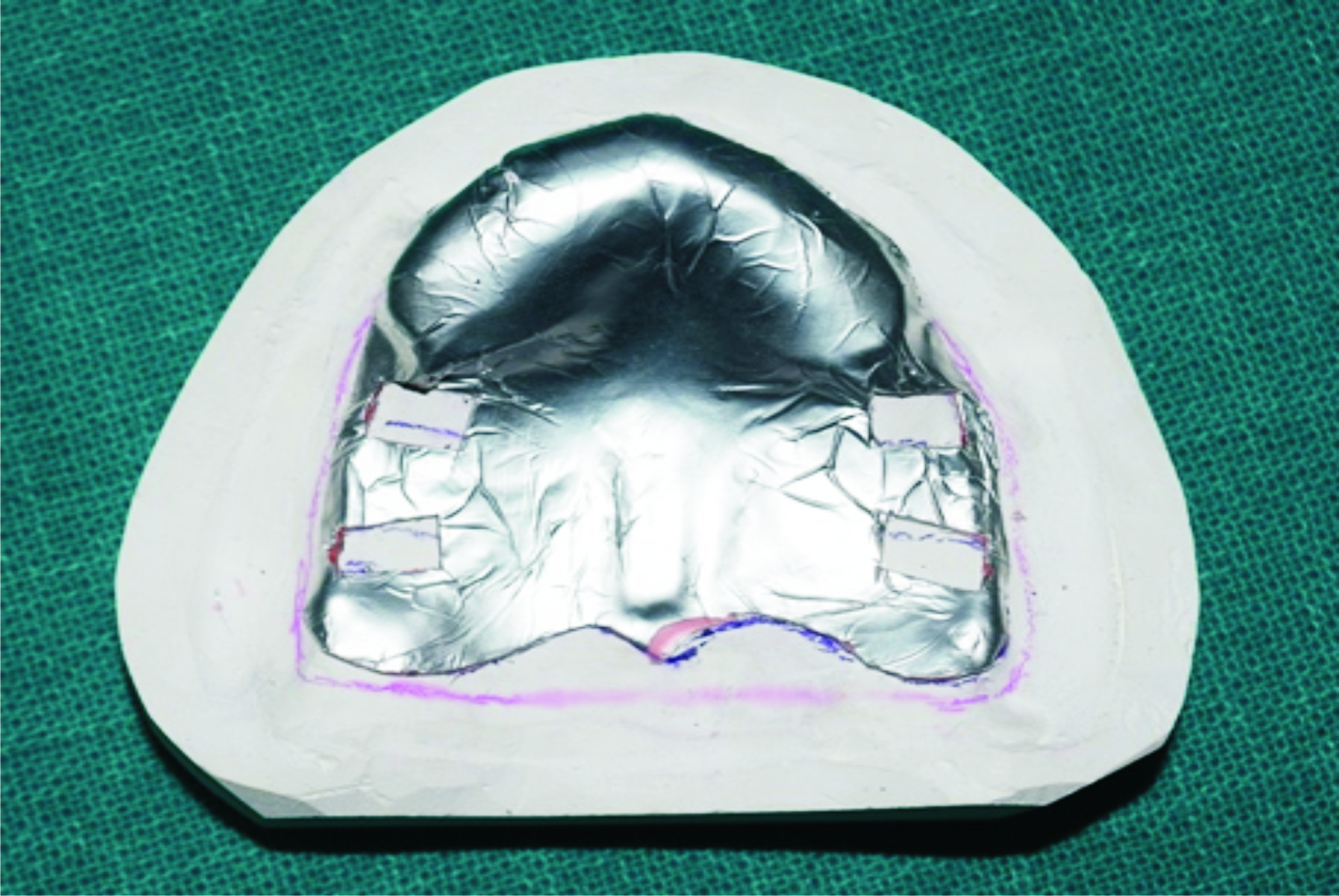
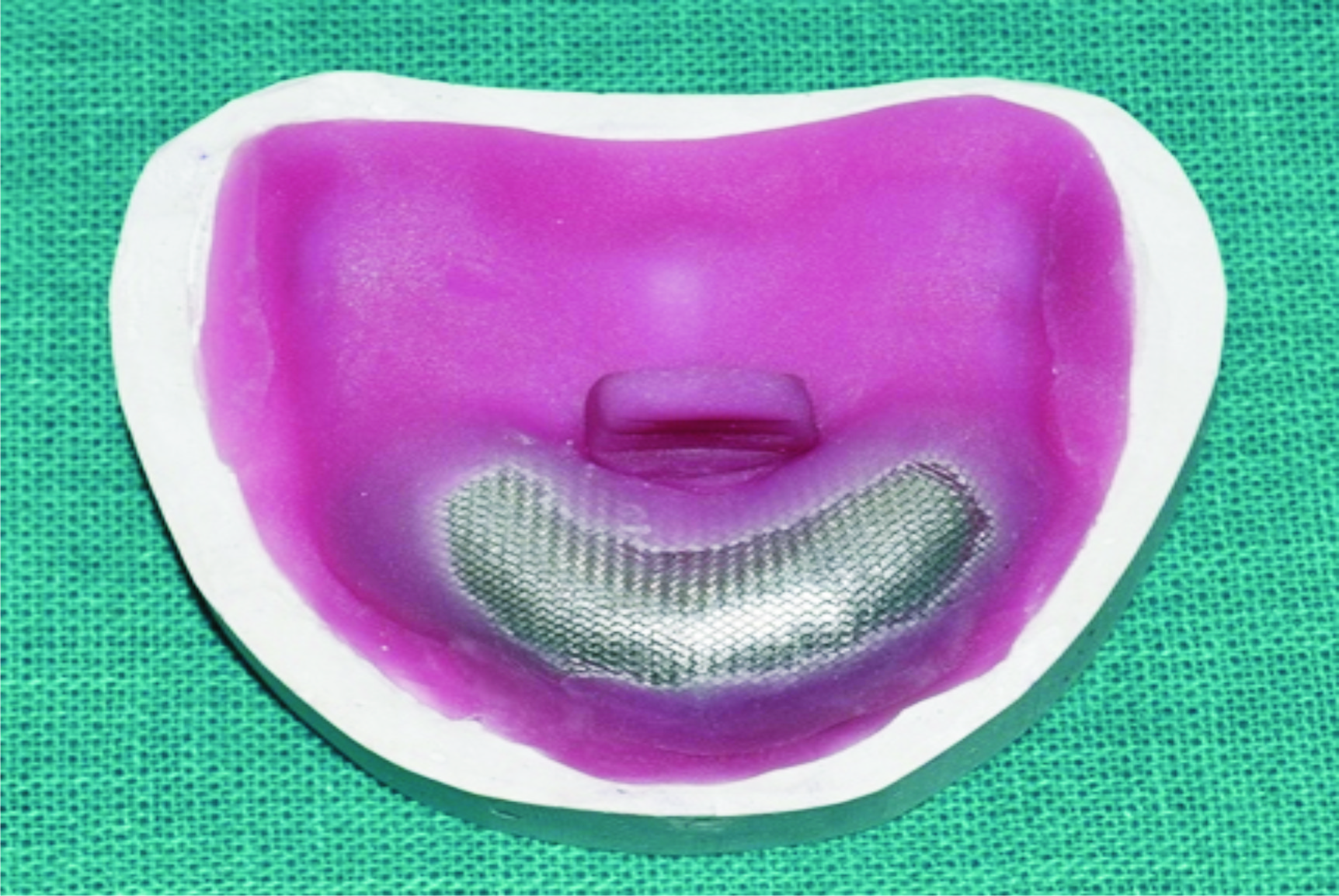
Completed border molding.
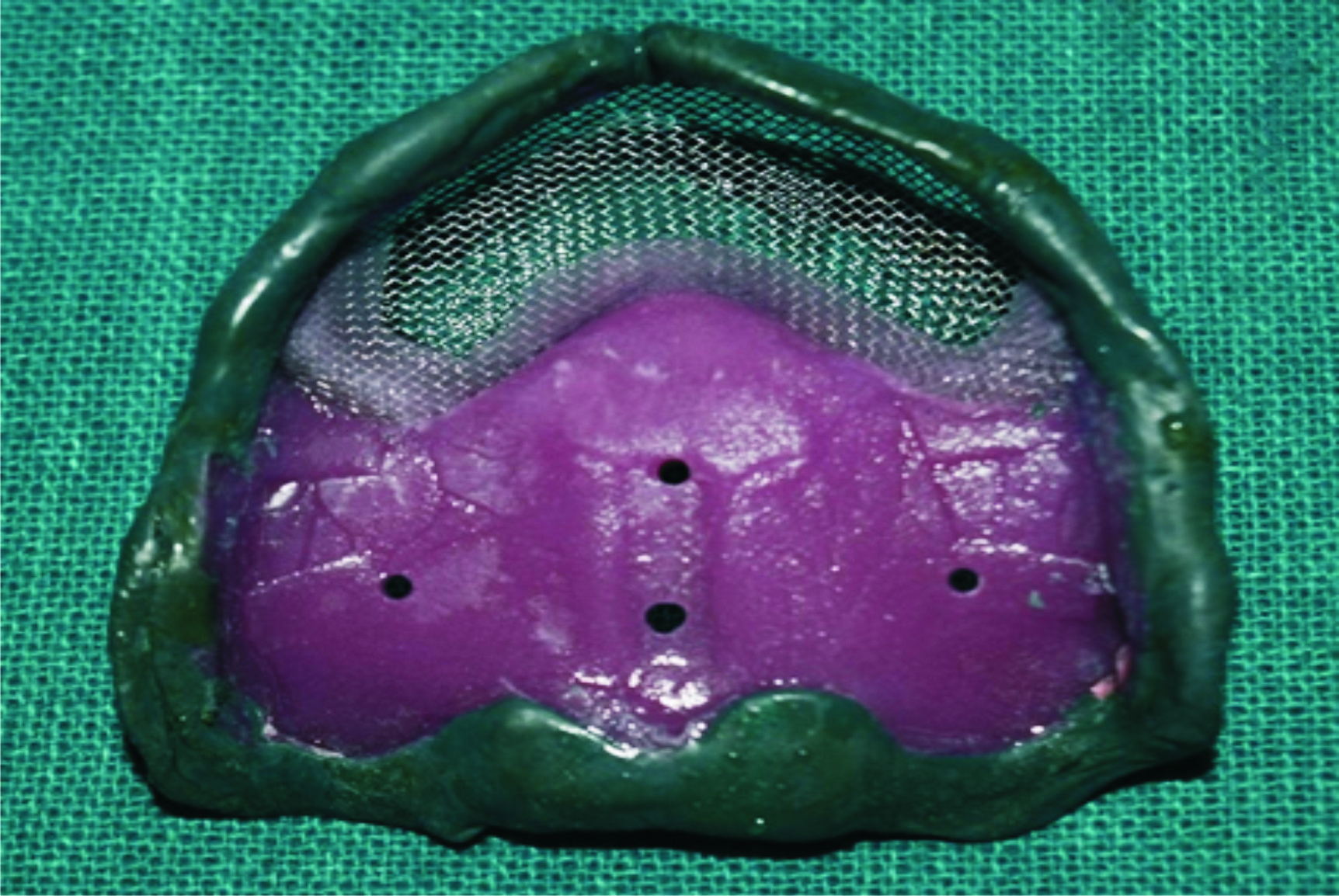
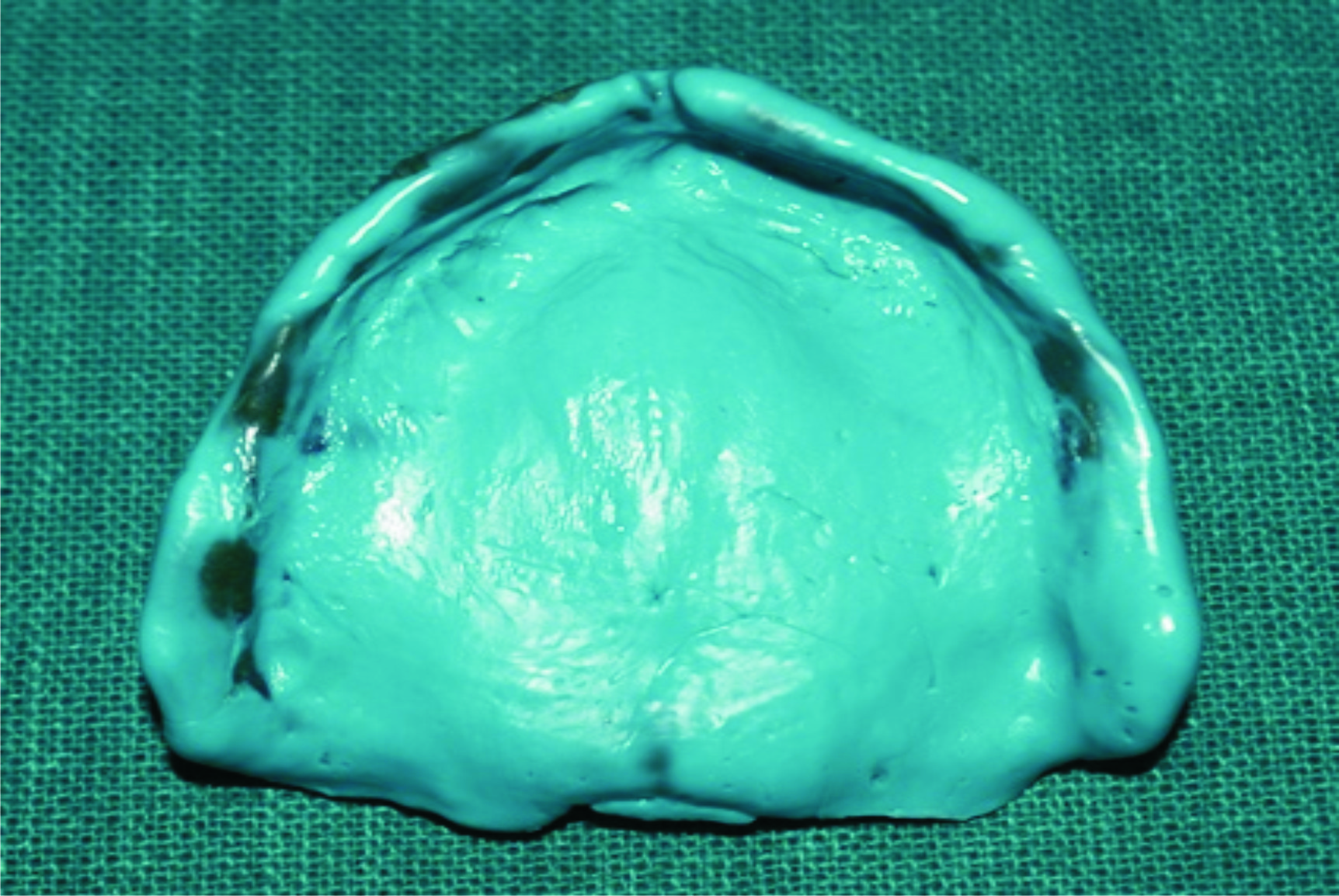
Discussion
Edentulous ridges which are mobile or resilient with limited support from bone may give the appearance of being “Flabby” [1]. According to Glossary of Prosthodontic Terms 9 (GPT)-‘Flabby tissue is defined as excessive, movable tissue’ [2]. Such a situation arises in some complete denture wearers where alveolar bone has been replaced by fibrous tissue. Flabby tissue/hypermobile ridge tissue is commonly seen in the anterior part of the edentulous maxillary ridge or overlying an atrophic knife-edge mandibular ridge [3]. The likely cause of fibrous tissue where there would otherwise be bone, is excessive occlusal loading on the residual maxillary ridge and /unstable occlusal relationships elsewhere in the mouth. These areas of mobile tissue provide limited support for the complete denture [1]. Masticatory forces can displace this mobile denture bearing tissue, leading to change in the denture positioning and loss of peripheral seal. Also, forces exerted while impression making can lead to distortion of the mobile tissue. A multitude of impression techniques have been described for overcoming the problem of the flabby ridge. These techniques include controlled lateral pressure technique, palatal splinting using two part tray system, selective composition flaming, window technique, use of multiple escape holes and two part impressions [4-8]. To simplify and overcome the limitations of the existing impression procedures, a novel impression technique is developed to record the flabby tissue in undistorted form and reminder of denture foundation in functional form.
The difficulty associated with previously presented techniques were in aligning the two impression trays, adherence of two different impression materials such as the one used for recording the flabby tissue and another for remainder of the denture bearing area.
Advantages
Metal mesh itself acts as multiple escape holes to provide relief, and acts as a scaffold for supporting the impression material while setting and pouring the cast.
Single stage impression with single impression tray and viscosity of impression material.
Ease of fabrication of impression tray and execution of technique.
No extra armamentarium required.
Patient friendly and economical.
Limitation
Adaptation of metal mesh is tricky.
Conclusion
This technique is an effective method for recording flabby tissue that meets the functional and biologic requirements of denture construction.
[1]. Laining LP, Zarb G, Sequelae caused by wearing complete dentures. In: Zarb, Hobkirk, Eckert, Jacob. Prosthodontic Treatment for Edentulous Patients 2013 13th EditionElsevier:48 [Google Scholar]
[2]. Ferro KJ, Driscoll CF, Freilich MA, Guckes AD, Khonerschild KL, Mcgarry TJ, Glossary of Prosthodontic Terms 9J Prosthet Dent 2017 117(5):e4010.1016/j.prosdent.2016.12.001 [Google Scholar] [CrossRef]
[3]. Ogle RE, Essentials of Complete Denture Prosthodontics 2015 3rd EditionAITBSPreparing the mouth for dentures:61 [Google Scholar]
[4]. Crawford RWI, Walmsley AD, A Review of prosthodontics management of fibrous ridgesBr Dent J 2005 199:715-19.10.1038/sj.bdj.481296816341179 [Google Scholar] [CrossRef] [PubMed]
[5]. Khan Z, Jaggers JH, Shay JS, Impressions of unsupported movable tissuesJ Am Dent Assoc 1981 103(4):590-92.10.14219/jada.archive.1981.02927026644 [Google Scholar] [CrossRef] [PubMed]
[6]. Osborne J, Two impression methods for mobile fibrous ridgesBr Dent J 1964 117:392-94. [Google Scholar]
[7]. McCord JF, Grant AA, Impression makingBr Dent J 2000 188(9):484-92.10.1038/sj.bdj.480051610859847 [Google Scholar] [CrossRef] [PubMed]
[8]. Allen F, Management of flabby ridge in complete denture constructionDent Update 2005 32:524-28.10.12968/denu.2005.32.9.52416317885 [Google Scholar] [CrossRef] [PubMed]